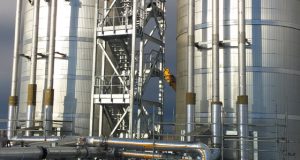In a dictionary, the word “sustainability” includes two definitions: the ability to be maintained at a steady rate, and the conservation of natural resources for ecological balance. There is perhaps no arena where these two ideas overlap more than they do in tissue production. The tissue industry is global in scale, resource intensive, consumer-oriented, and high volume—all areas where, no matter how it is defined, “sustainability” is of paramount importance.
For Sofidel, one of Europe’s largest tissue companies, the idea of sustainability includes long-term social and environmental advantages. Sofidel is the first Italian manufacturer—and the world’s first from the tissue sector—to join the WWF Climate Savers project, aimed at market-leading businesses with regard to the low-carbon economy, which sets particularly ambitious objectives.
Founded in 1966, the Sofidel Group is headquartered in Porcari, in the Italian province of Lucca. The company has more than 5,500 employees and a presence in 13 countries around the world. With annual production capacity topping one million metric tons, the group holds second place in Europe and sixth place worldwide in the tissue sector.
As part of its sustainable approach, the company measures its own growth not only by usual business parameters (such as margins, volume, and geographic coverage), but also by considering social return for the community. By 2020, Sofidel hopes to:
• Reduce its direct emissions of CO2 by 23 percent per metric ton of paper produced (from 2009 levels).
• Limit indirect emissions of CO2, caused by third parties within the value chain, by 13 percent per ton of paper produced (compared to 2010 levels).
• Reach 8 percent of energy from renewable sources on the quantity of fuel consumed annually.
To date, Sofidel has reduced its direct emissions of CO2 into the atmosphere by 19.1 percent (reduction in carbon intensity, 2009 – 2016), thanks to investments in energy efficiency, the use of cogeneration plants, and the use of renewable energy sources. The group has also limited use of water in its production facilities well below the industry average, and sources 100 percent of its pulp from certified and managed sources (FSC, PEFC, SFI).
AWARDING SUSTAINABILITY
Luigi Lazzareschi, CEO of the Sofidel Group, believes it is not enough to simply meet the company’s own sustainability goals. “Promoting sustainable and responsible growth also means, within our vision, raising awareness and promoting involvement of our partners so we can do more and do it better,” Lazzareschi says.
To that end, Sofidel created its Suppliers Sustainability Award (3Saward), which is supported by the Italian Ministry for the Environment and Protection of Land and Sea. Suppliers with notable projects associated with environmental and social sustainability were honored in November, 2017, in London. Nearly 400 suppliers from Europe and North America took part.
The award is based on the “TenP – Sustainable Supply Chain Self-Assessment Platform” created and promoted by the Global Compact Network Italia (GCNI) Foundation, of which the Sofidel Group is a founding member. Built on the UN Global Compact’s Ten Principles, the platform takes into account human rights, working conditions, the environment, and the fight against corruption, with the aim of identifying common challenges and solutions to improve supply chain sustainability.
Sofidel’s 3Saward was held in collaboration with partner companies Elettric 80, Fabio Perini, Södra, Henkel, A.Celli, Kemira, Industria Cartaria Pieretti, Pulsar, Fondazione Ecosistemi, Touchware, and Tissue World Magazine. The three categories, and the 2017 winners, are:
• Best Supplier – the company that has achieved the highest score on the TenP platform:
-Pulp Producers: Suzano Pulp and Paper Europe
-Procurement & Purchasing: Valmet
-Logistics Services: Kuehne + Nagel
-Marketing & Sales: Vizeum Deutschland GmbH (2nd year)
• Best Improver – the company that has obtained the best improvement in its results by setting up new environmental and social sustainability procedures:
-Pulp Producers: Zellstoff- und Papierfabrik Rosenthal GmbH
-Procurement & Purchasing: Windsor Engineering (Hull) Limited
-Logistics Services: LKW WALTER Internationale Transportorganisation AG
• Best Sustainable Project – the company that has implemented a particularly important environmental and social sustainability initiative (two winners in each category):
-Large Enterprises: Fibria International Trade GmbH; Skymark Packaging International Ltd.
-Medium/Small Enterprises: Dasara Trasporti S.p.A.; Groupe SGP
“We’re convinced that building a sustainable future involves a widespread, common commitment, and a need to assume, each within their area and according to their role, new and broader responsibilities,” concludes Lazzareschi.
 Paper 360
Paper 360
